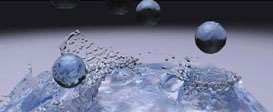Mesh Parameterization: Theory and Practice
![]() Full Conference
Full Conference ![]() One-Day Full Conference
One-Day Full Conference
Thursday, 11 December, 13:45 - 17:30
Room 313
Level: Intermediate
Mesh parameterization is a powerful geometry-processing tool with numerous computer graphics applications, from texture mapping to animation transfer. This course outlines its mathematical foundations, describes recent methods for parameterizing meshes over various domains, discusses emerging tools like global parameterization and inter-surface mapping, and demonstrates a variety of parameterization applications.
For any two surfaces with similar topology, there exists a bijective mapping between them. If one of these surfaces is a triangular mesh, the problem of computing such a mapping is referred to as mesh parameterization. The surface that the mesh is mapped to is typically called the parameter domain.
Parameterization was introduced to computer graphics for mapping textures onto surfaces. Over the last decade, it has gradually become a ubiquitous tool for many mesh-processing applications, including detail-mapping, detail-transfer, morphing, mesh-editing, mesh-completion, remeshing, compression, surface-fitting, and shape-analysis. In parallel to the increased interest in applying parameterization, various methods were developed for different kinds of parameter domains and parameterization properties.
The goal of this course is to familiarize attendees with the theoretical and practical aspects of mesh parameterization. It provides the skills needed to implement or improve existing methods, investigate new approaches, and critically evaluate the suitability of the techniques for a particular application.
The course begins with an introduction to the general concept of parameterization and an overview of its applications. The first half of the course then focuses on planar parameterizations, while the second addresses more recent approaches for alternative domains. The course covers the mathematical background, including intuitive explanations of parameterization properties like bijectivity, conformality, stretch, and area-preservation. The state of the art is reviewed by explaining the main ideas of several approaches, summarizing their properties, and illustrating them using live demos. The course concludes with a list of open research problems and potential applications that can benefit from parameterization.
Prerequisites
Some prior exposure to mesh representation of geometric models and a working knowledge of vector calculus, elementary linear algebra, and the fundamentals of computer graphics. Some familiarity with differential geometry and graph theory is useful, but not required.
Intended Audience
Graduate students, researchers, and application developers who want to understand and use the concepts and technologies used in mesh parameterization.
Instructors
Kai Hormann
Technische Universität Clausthal
Konrad Polthier
Freie Universität Berlin
Alla Sheffer
The University of British Columbia
Instructor Bios
Kai Hormann
Kai Hormann is an assistant professor of computer graphics in the Department of Informatics at Technische Universität Clausthal in Germany. His research interests are focused on the mathematical foundations of geometry-processing algorithms and their applications in computer graphics and related fields. He has co-authored several papers on parameterization methods, surface reconstruction, and barycentric coordinates. he received his PhD from the Universität Erlangen-Nürnberg in 2002 and spent two years as a postdoctoral research fellow at the Multi-Res Modeling Group at the California Institute of Technology and the CNR Institute of Information Science and Technologies in Pisa, Italy.
Konrad Polthier
Konrad Polthier is professor of mathematics at Freie Universität Berlin and the DFG research center MATHEON, and a member of the Berlin Mathematical School. He received his PhD from the Rheinische Friedrich-Wilhelms-Universität Bonn in 1994 and headed research groups at the Technische Universität Berlin and Konrad-Zuse-Zentrum für Informationstechnik Berlin. His current research focuses on discrete differential geometry and mathematical problems in geometry-processing applications. He has co-edited several books on mathematical visualization, and he co-produces mathematical video films. His recent video, MESH (jointly produced with Beau Janzen), has received international awards including Best Animation at the New York International Independent Film Festival. He has served as papers co-chair for international conferences including the ACM/Eurographics Symposium on Geometry Processing 2006.
Alla Sheffer
Alla Sheffer is an associate professor in the Computer Science department at The University of British Columbia. She investigates algorithmic aspects of digital geometry processing, focusing on several fundamental problems of mesh manipulation and editing. Her recent research addresses algorithms for mesh parameterization, processing of developable surfaces, mesh editing, reconstruction, and shape analysis. Her work on these topics had been published at top venues, including SIGGRAPH, EuroGraphics, and the Symposium on Geometry Processing. She co-authored several parameterization methods, including ABF/ABF++, which are used in popular 3D modelers including Blender, Maya, and Catia. She received her PhD from the Hebrew University of Jerusalem in 1999. Prior to moving to UBC in 2003, she was a postdoctoral fellow at the University of Illinois at Urbana-Champaign and an assistant professor at Technion - Israel Institute of Technology.








